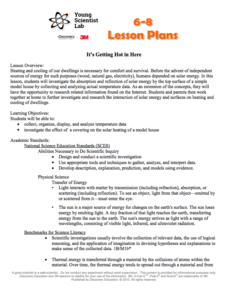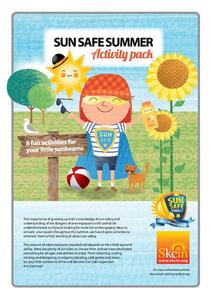Curated OER
Applied Science- Physics
Students investigate how something at home uses physics to work. In this practical physics instructional activity, students develop a theory of their own to conclude how an object might work. This lesson plan includes a worksheet.
Curated OER
Photosynthesis
Students conduct a variety of experiments on photosynthesis. In this biology lesson, students identify the factors required for the process to occur. They perform computerized experiments to test the amount of oxygen produced when plants...
Curated OER
The Science Behind Glow-in-the-Dark Toys
In this glow-in-the-dark activity, students read about substances that phosphor and their characteristics. Students also read about photo luminescence and glow-in-the-dark toys. They answer 6 questions about the light emitted by...
Curated OER
Watch Me Grow
Students observe that plants need air, food, light, and water to survive. In this plant biology instructional activity, students observe the growth and development of two plants, one is the control plant and the other is denied either...
Curated OER
Breaking It Down
Seventh graders explain the mechanism of digestion. In this biology activity, 7th graders perform an iodine test to check for the presence of starch. They discuss how energy travels through the food chain.
Curated OER
Stellar Spectral Fingerprints
Students listen as the teacher introduces Newton's early discovery of the diffraction of light. They use multiple sources of light (fluorescent, incandescent, sunlight, etc) to bend the light. They first use a prism then a diffraction...
Curated OER
Moon Light Through the Month
Students work in small groups to arrange moon phase cards into the correct sequence. The goal is to circle as many consecutive numbers as possible in two minutes.
Curated OER
Energy/Light/Heat/Sound
Fourth graders study the properties of heat in this series of lessons. They discuss sources of heat and experiment to determine its properties. They identify insulators and conductors by measuring temperatures, and graphing their data....
Curated OER
Solar Cell Simulation
Second graders describe how energy moves from the Sun to the photovoltaic cell to the wire and to the load. In this solar cell simulation lesson, 2nd graders demonstrate the movement of photons and electrons to emulate how solar energy...
Curated OER
Cell Energy-Bubbling Plants
Middle schoolers discuss the process of photosynthesis in plants and that oxygen is produced as a by product. They observe underwater Elodea plants "breathing" in a hands-on activity. After setting up the experiment, they observe the...
Curated OER
Sound
Students complete a unit to learn about sound; students include multiplication and division problems along with rate problems. In this sound lesson, students complete 7 separate lessons with multiple activities to learn about sound.
Discovery Education
It's Getting Hot in Here
Class members engage in a STEM experiment and investigate how materials affect heating in a house by creating models of houses and using different top surface materials. They record the temperature inside the models and consider what the...
Curated OER
The Greenhouse Effect
In this Earth Science worksheet, students read about the Greenhouse Effect and the difference between natural and amplified warming. Following, they answer ten short answer questions related to what they read about global climate issues.
Teach Engineering
Flame Test: Red, Green, Blue, Violet?
Let the true colors shine through. Pupils conduct a flame test to identify an unknown element. Class members calculate and prepare specific molarity solutions of three chemicals. Using their observations of the colors emitted, they...
University of Texas
Lives of Stars
Stars exist from a few million years to over 10 billion years, depending on their mass. Scholars perform a play acting as stars to learn about their different life cycles. They develop an understanding of many of the fundamental concepts...
Space Awareness
Climate Zones
The climate at the equator is hotter than the climate at the poles, but why? The lesson goes in depth, explaining how the angles of illumination relate to the heating rate at different latitudes and seasons. Scholars use a strong lamp,...
Messenger Education
Sensing the Invisible: The Herschel Experiment
The electromagnetic spectrum includes everything from very powerful gamma rays (which are used to treat cancer) to much weaker radio waves (which include microwaves). Through a hands-on activity, scholars explore the temperature...
NASA
Speaking in Phases
Hear from deep space. Pupils learn how satellites transfer information back to Earth. They learn about three different ways to modulate radio waves and how a satellite sends information with only 0s and 1s. Using sound, class members...
Colorado State University
Why Does it Get Colder on a Clear Night than a Cloudy Night?
Clouds are nature's insulator! A lab investigation asks learners to use an infrared thermometer to measure differences in infrared temperatures. They find that pointing the thermometer at a cloud has a much different result than pointing...
Teach Engineering
Bone Mineral Density Math and Beer's Law
Hop into a resource on Beer's Law. A PowerPoint presentation introduces Beer's law as part of calculating bone density from X-ray images in the sixth lesson in the series of seven. Individuals work on practice problems with this law and...
NASA
Photons in the Radiative Zone: Which Way Is Out? An A-Maz-ing Model
Can you move like a photon? Young scholars use a maze to reproduce the straight line motion of a photon. The second in a six-part series of lessons on the sun has learners measure angle of incidence and refraction to determine the path...
Skcin
Sun Safe Summer Activity Pack
Eight activities make up a packet all about sun safety. Scholars mix and match how animals stay sun safe, dress paper dolls in appropriate summer clothing, make a cootie catcher, solve word puzzles, grow sunflowers, examine pictures,...
Urbana School District
Magnetism
The compass was first used in 206 B.C., but we didn't discover magnetic poles until 1263 A.D. Presentation begins with the history of magnetism before continuing on to magnetic fields, magnetic forces, electromagnets, currents,...
Teach Engineering
Bubbles and Biosensors
Bubbles aren't just for children. In the third installment of a seven-part series, teenagers use bubble solution to create bubbles and observe patterns of refraction on the bubble surfaces. Application of this concept to thin films in...
Other popular searches
- Heat and Light Energy
- Absorption of Light Energy
- Sound and Light Energy
- Heat Light Sound Energy
- Heat Light Energy
- Light Energy and Colors
- Light Energy Colors
- Light and Energy Experiment
- Light Energy & Color
- Light Energy Diagram
- Light Energy Transformed
- Energy and Light Bulbs

























